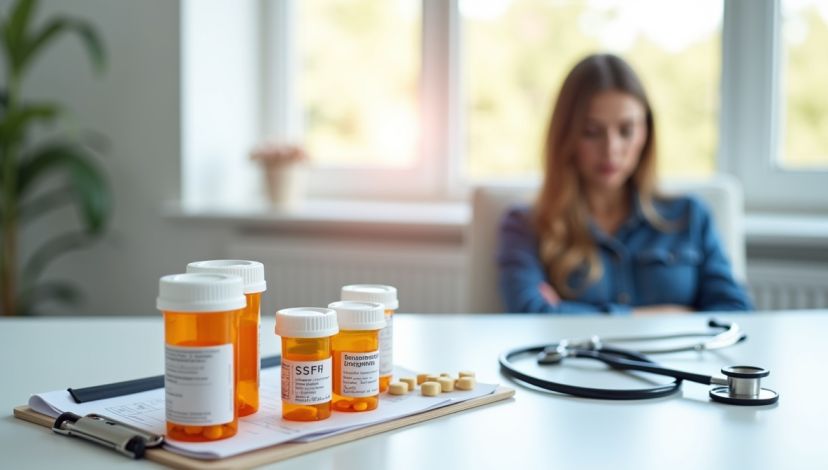Millions of people across the world live with anxiety, but it transforms their ordinary day into stressful and frightening experiences, which they feel very uncomfortable. Professional assistance is the solution in the form of medications to enable symptoms control and to pave the way to control their lives to many people. But with so many options on the market, it’s natural to wonder: What are the top 10 medications for anxiety? The idea that someone can learn about the most prescribed medication, their mechanism of action, and their expected effects, and empower them to make their choices with the help of medical workers will result in patients and caregivers being knowledgeable about their condition.
Anti-anxiety medicines are both quick-responding benzodiazepines and longer-term antidepressant medications, which correct the brain chemistry over a span of time. All of them have their niche as they are applied depending on the nature of anxiety, their severity, and personal health history. Visiting a psychiatrist or a physician guarantees the correct medication, depending on the individual.
Key takeaways:
- The types and selection of anxiety medications are diverse in the aim of treating the symptoms of the patient, according to the type of anxiety.
- The reason why some drugs, such as SSRIs and SNRIs, are first-line drugs is that they are relatively safe and effective.
- Quick actions, such as benzodiazepines, are effective in the short run, though these drugs must be under close medical care because of the problem of dependence.
Which Are the Major Classifications of Medications on Anxiety?
Treatments of anxiety could be vaguely clustered into some major categories depending on their impact on the brain and the body as a whole. These categories are divided as follows, with some typical examples to get a feel about the landscape:
1. Selective serotonin reuptake inhibitors (SSRI)
SSRIs effect is by increasing the amount of serotonin in the brain, which is one of the neurotransmitters in the body which controls mood and anxiety. They are found to be effective and safe, which makes them first-line medications of generalized anxiety disorder (GAD) and other types of anxiety.
Examples: sertraline (Zoloft), Escitalopram (Lexapro), Fluoxetine (Prozac), Paroxetine (Paxil), and Fluvoxamine (Luvox)
Use Case: Jane is a 32-year-old suffering from chronic worrying and panic attacks when she started using Lexapro after consultations with the doctor. In 4 weeks, she reported less panic attacks and better sleep.
2. Serotonin-Norepinephrine re-absorption Inhibitors (SNRIs)
SNRIs boost the level of serotonin and norepinephrine, which contributes to the enhancement of the mood and the decrease of the symptoms of anxiety. They can apply when SSRIs are inadequate or unable to tolerate.
- Examples: Venlafaxine (Effexor), Duloxetine (Cymbalta).
- Use Case: Mark used Venlafaxine due to the failure of the SSRIs to manage his anxiety and the concomitant facial forcing entirely.
3. Benzodiazepines
These drugs increase the level of the relaxing neurotransmitter GABA and help in the immediate elimination of symptoms of anxiety, like heart racing, agitation. They are commonly prescribed as short-term medication because of tolerance and dependence risks.
- Examples: alprazolam (Xanax), lorazepam (Ativan), Diazepam (Valium)
- Use Case: In the case of pre-operative acute anxiety, a physician administered Ativan to ease the present distress and boost composure in Mark.
4. Beta-Blockers
The physical symptoms of anxiety, such as rapid heartbeat and trembling, can be countered with the help of beta-blockers that interfere with the effects of adrenaline.
- Examples: propranolol (Inderal), atenolol
- Use Case: Occasionally propranol can also be use by public speakers who wish to calm their palpitations without affecting their mental clarity to overcome stage fright.
5. Other anti-anxiety drugs
It consists of such medications as Buspirone, which allows to control the anxiety level without lifelessness and inability to addict, and some atypical antipsychotics or anticonvulsants prescribed off-labeled to treat anxiety.
Comparison Table of the Top 10 Medications to Treat Anxiety
The list below shows the comparison of the top 10 anxiety medications regarding the type of drug, the common way to use it, advantages, and notes.
| Medication | Drug Class | Typical Use | Key Benefits | Important Considerations |
| Sertraline (Zoloft) | SSRI | Generalized anxiety, panic | Well-tolerated, effective | It may take weeks for the full effect |
| Escitalopram (Lexapro) | SSRI | Generalized anxiety, depression | Low drug interaction risk | Possible nausea, headache |
| Fluoxetine (Prozac) | SSRI | Anxiety, OCD | Long half-life, mood stabilizer | Insomnia, sexual side effects |
| Paroxetine (Paxil) | SSRI | Social anxiety, panic | Effective for multiple anxiety disorders | Risk of withdrawal symptoms |
| Venlafaxine (Effexor) | SNRI | Generalized anxiety | Dual neurotransmitter action | Elevated blood pressure is possible |
| Duloxetine (Cymbalta) | SNRI | Anxiety, chronic pain | Also treats pain, fatigue | Nausea, dry mouth |
| Alprazolam (Xanax) | Benzodiazepine | Acute anxiety, panic attacks | Rapid action | Risk of dependence, sedation |
| Lorazepam (Ativan) | Benzodiazepine | Severe anxiety, insomnia | Quick calming effect | Short-term use recommended |
| Propranolol (Inderal) | Beta-blocker | Performance anxiety | Controls physical symptoms | Not for asthma patients |
| Buspirone | Anxiolytic (non-benzodiazepine) | Generalized anxiety | Non-addictive, fewer sedative effects | Takes several weeks to work |
Table 1: Overview of the 10 most frequently used medications in the treatment of anxiety, including the essence of their application and the areas of concern.
ALT text: Table of the top 10 anxiety medications by type, use, benefits, and considerations.
How to Select Proper Anxiety Medication Choice
The choice of the most efficient medication is based on various issues such as the form of anxiety disorder, the degree of the symptoms, the specific medical history, and the individual preferences of a person. A large number of patients collaborate with the psychiatrists who can begin treatment with the use of an SSRI or SNRI because of the safety index of the drug and its efficacy.
A clinical example: Patient Emily was diagnosed with generalized anxiety disorder, and experimented with sertraline, which caused her to experience nausea, and she switched to taking escitalopram, with which she did not have such a problem. Three months later, her symptoms of anxiety significantly decreased, and she resumed full-time employment.
Critical point: Do not ever begin, discontinue, or change the dose of anxiety medication without professional instruction to prevent the withdrawal manifestations and make sure that it is safe.
Typical side effects and risks of anxiety drugs: Medicines Common side effects and risks of anxiety medications
Side effects of anxiety medication differ depending on the type of medication an individual is taking; this knowledge comes in handy when trying to determine what to expect.
- SSRI and SNRI: nausea, headaches, insomnia, sexual dysfunction, worsening anxiety on a temporary basis may occur (temporary)
- Benzodiazepines: impairment of wakefulness, blurred vision, lack of coordination, and the risk of addiction
- Beta-blocker: tired, cold hands, may have problems breathing during an asthma attack
- Buspirone: light-headedness, nausea, headache
Per Healthgrades review of 2024, SSRIs and SNRIs are the best first-line drugs to use in anxiety over a long period of time, as they lack dependence, whereas benzodiazepines are associated with dependence and should not be used for more than a short period of time.
Trends of Anxiety Drug Treatment in the Future and New Treatment
The situation in the field of anxiety treatment is changing, where new medications are under development to be more efficient and with fewer side effects.
| Medication/Approach | Status | Key Benefits |
| Vortioxetine | FDA-approved antidepressant | Improved cognitive function, fewer sexual side effects |
| Pregabalin | Off-label for anxiety | Effective for generalized anxiety, with less abuse potential |
| Digital therapeutics | Emerging non-drug options | Behavioral therapy adjunct with app-based support |
Table 2: New drugs and remedies of anxiety treatment.
Alt text: Table of new and emerging anxiety treatment, vortioxetine, pregabalin, and digital therapeutics.
Recap: Therapy and lifestyle changes, along with medication, provide the best solution to holistic management of anxiety.
Conclusion
It is essential to know what the top 10 medications of anxiety are so that an individual could be free of this difficult situation. SSRIs and SNRIs are the most widespread and efficient long-term remedies, providing great assistance in dealing with a general anxiety disorder and disorders accompanying it. Benzodiazepines act fast, although they are unsafe because of addictions. Beta-blockers and other anxiolytics are used in special quests such as performance anxietyum or refractory symptoms.
The bottom line is that the process of discovering the right medication is a unique one that requires a practitioner most ideally. Patients must keep in mind that the use of medications is only a holistic approach where there is more therapy, care, and lifestyle changes in order to enjoy long term peace of mind.
So start now, by going to your physician and talking about your condition and treatment alternatives to ensure you are on the best anxiety medication and that it is the best fit to your personal circumstances.
FAQs
Q1: Which is the commonest drug to treat anxiety?
A: The most common are SSRI antidepressants, of sertraline (Zoloft) and escitalopram (Lexapro) that are safe and effective.
Q2: Do anxiety medications result in an addiction?
A: Benzodiazepines are addictive, and most SSRIs, SNRIs, and buspirone are not addictive.
Q3: What is the time it takes anxiety drugs to take effect?
A: It normally takes 4-6 weeks to experience the full effects of SSRIs and SNRIs, but benzodiazepines achieve effects within a few hours.
Q4: Is it possible to quit anxiety medication when I am good?
A: No, you should always consult your doctor about stopping medication; otherwise, there will be withdrawal and most likely relapse.
Q5: Do we have alternative forms of remedy to anxiety medications?
A: Therapy, mindfulness, and other lifestyle changes can help, but in moderate and severe anxiety, medications are usually needed.













